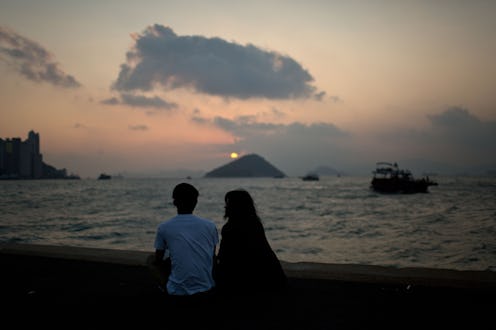News
When Will It Get Dark Without Daylight Savings?
Daylight savings officially ended on Sunday at 2 a.m., and while I doubt anyone could take issue with brighter mornings and an additional hour of beauty sleep, there's one catch to falling back: earlier sunsets. Naturally, earlier sunsets mean it will be getting darker earlier, and the sun will gradually begin to set a little bit earlier until peaking on the winter solstice, which happens to fall on Tuesday, December 22, this year. But at least for right now, with daylight saving over, when will it get dark?
The answer varies a little based on your time zone. According to timeanddate.com, if your state falls under the Pacific time zone, the sun will begin to set at exactly 5 p.m. Sunday, and from there, it will gradually set earlier and earlier until the solstice. If your state is situated in the Mountain time zone, you'll also find that the sun will begin to set at around 5 p.m. in local time, according to timeanddate.com, with some variance based on which city you live in.
Meanwhile, if your state falls under the Central time zone, the sun will begin to set for you at about 5:40 p.m. However, this could differ by about 10 minutes depending on which city you live in. For example, the sun will set at about 5:46 p.m. in Chicago, while it will set at 5:35 p.m. in Oklahoma City. In the Eastern time zone, the sun will begin to set at about 5 p.m., again, depending slightly on which city you live in. In New York City, the sun will set at about 4:53 p.m., while in Washington, D.C., it will set at about 5:08 p.m., and in Boston, at about 4:38 pm.
If you're already missing sunlight and long days, you're certainly not alone. In fact, Vox has even made the case for year-round Daylight savings, pointing out how adjusting to a new time twice a year actually leads to increased "rates of heart attacks, traffic accidents, and workplace injuries." The original idea of "falling back," proposed in 1895 in New Zealand, was essentially meant to optimize productivity by forcing everyone to wake up an hour earlier. The idea of Daylight saving and "springing forward" was adapted in the United States around World War I, and again in World War II, in an effort to save fuel.
But for right now, it doesn't appear as if Daylight Saving is going anywhere. It looks like you'll just have to wait for 2 a.m. on March 13, 2016.
